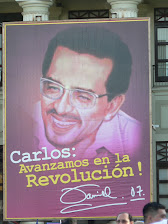
“Mr. Chávez should just keep quiet. The more he meddles, the easier it is to believe that the charges against him are true.”
King NYTimes is not the first monarch to tell brother Hugo to shut up. Not so long ago the King of Spain tried his hand at the same game, and won universal scorn and ridicule in Indo-Latin America.
This round will likely not attract as much attention since it is not televised, not in Spanish, and comes from gringos. Their arrogrance is old hat south of the Rio Bravo.
Felipe Stuart
Managua

Hugo Chávez not likely to heed royal advice
http://www.nytimes.com/2008/03/06/opinion/06thu2.html?ref=opinion
March 6, 2008
Editorial
Take a Deep Breath
South America has had more than its share of border conflicts. Still, it is hard to believe that in the 21st century the democratically elected governments of Colombia, Ecuador and Venezuela would be talking about war.
Colombia’s decision to send forces into Ecuador on Saturday to kill a Colombian guerrilla commander was an infringement of Ecuador’s sovereignty — a sensitive issue anywhere, but especially in Latin America. Ecuador immediately severed diplomatic ties and said it would move troops to its northern border with Colombia.
Venezuela — whose territory wasn’t violated — jumped in. President Hugo Chávez, who thrives on such crises, expelled Colombia’s ambassador, ordered forces to his border and threatened to block trade. Colombia then accused both Venezuela and Ecuador of aiding and abetting the Revolutionary Armed Forces of Colombia, the guerrilla group known as FARC.
We were reassured Wednesday that the Organization of American States has now decided to send a commission to investigate the raid and convene a meeting of foreign ministers to consider the results.
Ecuador and Colombia must settle their differences through diplomatic means. As a first step, Ecuador’s president, Rafael Correa, and Álvaro Uribe, the president of Colombia, should reject the Venezuelan leader’s meddling and manipulation. They should recognize that he is cynically, and dangerously, trying to use their dispute to revive his own flagging political fortunes.
Despite the personal mistrust between the left-leaning Mr. Correa and the right-leaning Mr. Uribe, Ecuador and Colombia have cooperated in the past. Mr. Correa says that Ecuadorean forces have already dismantled many FARC camps.
Colombia must provide reassurances that it will respect Ecuador’s border and that such forays will not be repeated. Ecuador, in turn, must satisfy Colombia that it is not assisting the brutal guerrilla group that has terrorized Colombians for decades.
Colombia’s government claims that during the raid, its troops captured a FARC computer that contained evidence that Mr. Chávez’s government had given $300 million to the guerrilla group. Colombia said files on the computer also indicated Mr. Correa’s government had been harboring FARC members.
Ecuador and Venezuela have denied the charges, but the claims are very worrisome. The two governments should be condemned by the O.A.S. if the information proves to be true. Before that can be addressed, Colombia must share the computer and its data with the O.A.S.
For now, Mr. Correa and Mr. Uribe should cool their rhetoric and begin a serious discussion about how they can jointly secure their borders against the FARC.
Mr. Chávez should just keep quiet. The more he meddles, the easier it is to believe that the charges against him are true.



No comments:
Post a Comment